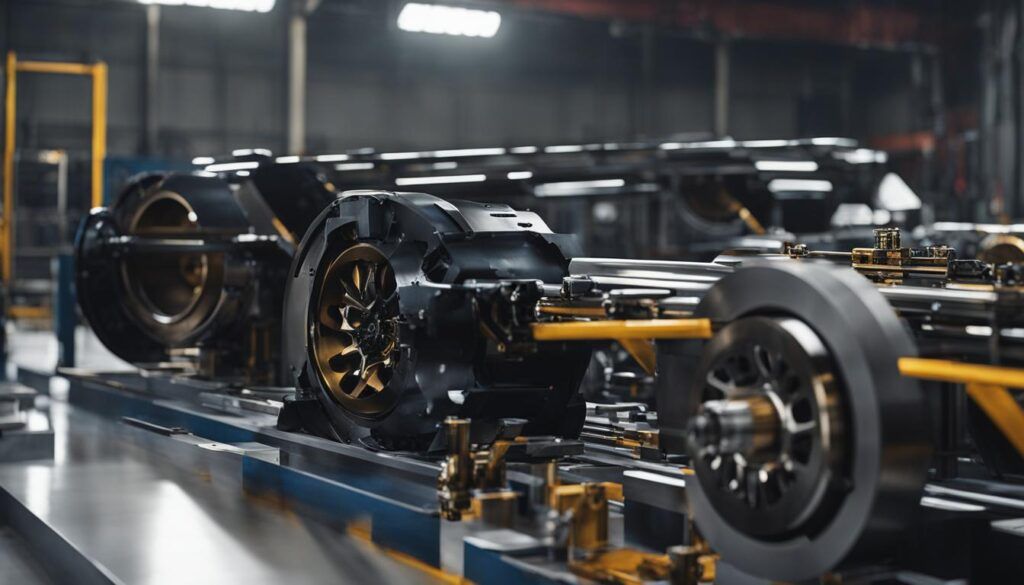Advantages and Challenges of Working with Alloy Metals
- August 8, 2023
Alloys, also known as metal alloys, are created by combining two or more substances to form a product with superior properties compared to individual metals. These alloys are typically produced by melting and merging metals, but non-metallic components can also be added. Alloy metals offer numerous advantages over pure metals, such as improved corrosion resistance, lower costs, higher strength, and better workability. The alloy composition and properties can be tailored to suit specific requirements, making them highly versatile and applicable across various industries like automotive, construction, and manufacturing.
However, working with alloy metals can present its fair share of challenges. Specialized manufacturing processes are often required to produce alloys, and certain environments may cause corrosion. Despite these challenges, the benefits and flexibility of alloy metals outweigh the drawbacks, making them a popular choice in many industries.
Key Takeaways:
- Alloy metals are created by combining two or more substances to enhance their properties.
- Advantages of alloy metals include improved corrosion resistance, lower costs, higher strength, and better workability.
- Alloy metals have a wide range of applications across industries like automotive, construction, and manufacturing.
- Working with alloy metals may require specialized manufacturing processes.
- Corrosion can be a concern when working with alloy metals in certain environments.

Types of Alloy Metals
When it comes to alloy metals, there’s no shortage of options to choose from. Each type of alloy has its own unique composition and properties that make it suitable for specific applications. Let’s explore some of the most common types of alloy metals and their characteristics:
Brass
Brass is an alloy composed of copper and zinc. It is known for its attractive golden color and excellent formability. Due to its low melting point and high workability, brass is often used for fittings, plumbing components, and musical instruments.
Bronze
Bronze is an alloy consisting of copper and tin. It offers superior strength, corrosion resistance, and durability compared to pure copper. Bronze is commonly used for bearings, statues, and decorative pieces due to its beautiful appearance and ability to withstand outdoor conditions.
Stainless Steel
Stainless steel is a versatile alloy that contains iron, chromium, and other elements. It is highly resistant to corrosion and staining, making it ideal for applications that require durability and hygiene, such as kitchenware, medical instruments, and architectural structures.
Aluminum Alloys
Aluminum alloys are lightweight yet incredibly strong. These alloys are composed of aluminum, combined with other elements such as copper, magnesium, and zinc. They offer excellent strength-to-weight ratios, making them ideal for use in the aerospace industry, automotive components, and structural applications.
Titanium Alloys
Titanium alloys are known for their exceptional strength, low density, and corrosion resistance. These alloys are primarily composed of titanium, along with elements such as aluminium, vanadium, and iron. They find extensive use in aerospace engineering, medical implants, and marine applications.
Here’s a table summarizing the composition and properties of these alloy metals:
| Alloy Metal | Composition | Properties |
|---|---|---|
| Brass | Copper and zinc | Attractive appearance, high formability |
| Bronze | Copper and tin | Superior strength, corrosion resistance |
| Stainless Steel | Iron, chromium, and other elements | Highly corrosion-resistant, durable |
| Aluminum Alloys | Aluminum with copper, magnesium, and zinc | Lightweight, strong, and versatile |
| Titanium Alloys | Titanium with aluminium, vanadium, and iron | High strength, low density, corrosion resistance |
As you can see, alloy metals offer a wide range of options, allowing manufacturers to select the most appropriate material for their specific applications. The specific composition and properties of an alloy are carefully chosen to achieve the desired characteristics in the final product.
Applications of Alloy Metals
Alloy metals play a crucial role in various industries, offering immense potential and utility in a plethora of applications. They are extensively utilized in the manufacturing sector, providing essential materials for the production of automotive components, such as transmission cases and oil pans. The versatility of alloy metals makes them ideal for use in construction as well, where they are commonly employed in plumbing hardware and pipe fittings. Additionally, alloys find a valuable place in the medical field, where their biocompatibility and strength make them an excellent choice for dental implants and surgical instruments.
The alloy industry thrives on catering to the demands of different applications. Numerous suppliers contribute to this industry by offering a diverse range of alloy materials, ensuring that manufacturers and businesses are equipped with the necessary resources to meet their specific requirements. With the continuous growth of the alloy market, industries across the board are recognizing the exceptional benefits and versatility that alloy metals bring to their products.
“Alloy metals are essential in transforming industries, bringing strength, durability, and adaptability to diverse applications. Their extensive use in manufacturing, construction, and the medical field highlights the immense value they hold in driving innovation and progress.”
Reasons for Utilizing Alloy Metals
- Enhanced Strength: Alloy metals offer superior strength compared to their individual components, making them suitable for applications that require robust materials.
- Corrosion Resistance: Alloy metals exhibit improved resistance to corrosion, ensuring longevity and reliability in challenging environments.
- Diverse Applications: Alloy metals find applications in multiple sectors, ranging from automotive and construction to healthcare and beyond.
- Customizability: Alloy compositions can be tailored to specific requirements, allowing for the creation of materials with targeted properties.
- Cost-effectiveness: Alloys often provide a cost-effective solution compared to pure metals, offering a balance between performance and affordability.
Industry Insights: Alloy Applications
Let’s take a closer look at some key industries that benefit from the application of alloy metals:
| Industry | Alloy Applications |
|---|---|
| Automotive |
|
| Construction |
|
| Healthcare |
|
| Aerospace |
|

From the automotive industry, where alloys contribute to improving fuel efficiency and performance, to the construction sector, where alloy materials ensure the longevity and stability of structures, the applications of alloy metals are vast and impactful. Healthcare also benefits from the unique properties of alloys, which enable the development of biocompatible and durable medical implants. Moreover, the aerospace industry relies on alloys to produce lightweight yet robust materials for aircraft components, ensuring safety and efficiency.
The wide-ranging applications of alloy metals demonstrate their significance in driving progress and innovation across multiple sectors. As industries continue to evolve and find new uses for these versatile materials, the alloy market thrives, providing solutions tailored to meet the demands of specific applications. Alloy metals truly shape the modern world we live in, pushing the boundaries of what is possible in manufacturing, construction, healthcare, and beyond.
Advantages of Alloy Metals
Alloy metals offer numerous advantages over pure metals, making them a preferred choice in various industries. One of the key advantages is their improved corrosion resistance, which allows alloys to thrive in environments prone to rust and deterioration. This corrosion resistance extends the lifespan of alloy components and reduces the need for frequent replacements, resulting in cost savings and enhanced reliability.
Furthermore, alloy metals are renowned for their durability, making them capable of withstanding heavy loads and harsh conditions without significant wear or deformation. This durability is vital in applications that require long-lasting and robust materials, such as structural components in buildings or machinery.
In addition to corrosion resistance and durability, alloy metals often possess excellent thermal and electrical conductivity. This property enables efficient heat transfer and electrical transmission, making alloys valuable in applications that require optimal energy efficiency and performance, including electrical wiring and heat exchangers.
The specific advantages of alloy metals depend on their composition and properties, which can be tailored to meet the specific requirements of different products and industries. By adjusting the alloy composition, manufacturers can optimize properties such as strength, hardness, and flexibility to create alloys that perfectly align with the desired application.
Overall, the advantages of alloy metals, including corrosion resistance, durability, thermal conductivity, and electrical conductivity, make them a versatile and reliable choice for various industries, from automotive and construction to electronics and aerospace.
The Benefits of Alloy Metals at a Glance:
- Improved corrosion resistance
- Enhanced durability
- Excellent thermal conductivity
- Superior electrical conductivity
- Tailorable properties for specific applications
Conclusion
In conclusion, working with alloy metals comes with its advantages and challenges. Alloy metals offer improved properties compared to pure metals, including enhanced corrosion resistance, lower costs, higher strength, and better workability. They have a wide range of applications across various industries, from automotive to construction.
However, it is important to note that working with alloy metals may require specialized manufacturing processes, and the potential for corrosion in certain environments should be considered. Despite these challenges, the benefits and versatility of alloy metals make them a popular choice for many industries.
By understanding the types of alloy metals available, their applications, and the advantages they offer, individuals and businesses can make informed decisions when it comes to utilizing alloy metals in their projects. Whether it’s selecting the right alloy composition for a specific application or implementing proper corrosion prevention measures, taking these factors into account can lead to successful and efficient use of alloy metals.
FAQ
What are alloy metals?
Alloy metals are formed by combining two or more substances to create a product with better properties than any of its individual components. They are often made by melting and combining metals, although non-metallic components can also be included.
What are the advantages of working with alloy metals?
Alloy metals offer several advantages over pure metals, including improved corrosion resistance, lower costs, higher strength, and better workability. They also have a wide range of applications across various industries, such as automotive, construction, and manufacturing.
What types of alloy metals are there?
Some common types of alloy metals include brass, bronze, stainless steel, aluminum alloys, and titanium alloys. Each has its own unique composition and properties, which are chosen based on the desired characteristics of the final product.
What are the applications of alloy metals?
Alloy metals are commonly used in the manufacturing sector for automotive components, construction industry for plumbing hardware, and in the medical field for dental implants and surgical instruments. Their versatility allows them to be utilized in various industries.
What are the advantages of alloy metals?
Alloy metals offer advantages such as improved corrosion resistance, durability, thermal and electrical conductivity. They are known for their ability to withstand heavy loads and harsh conditions without significant wear or deformation.
